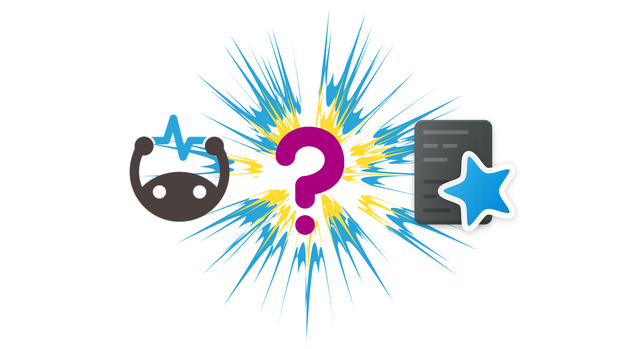When it comes to leveraging the power of spaced repetition for serious learning, few apps bear up to the reputations of Brainscape and Anki, both popular choices among learners for flashcard-based studying.
And since you’re here, you’re probably curious about which of these is the best flashcard tool to help you learn more efficiently. Is Anki the best? Or is Brainscape a better Anki alternative?
You might have noticed the obvious conflict of interest.
Don’t worry. We’re not going to praise Brainscape and trash Anki with no regard for the facts. First and foremost, we're purveyors of learning and the most efficient ways to do that.
Here’s our informed guide on how Brainscape is different from Anki and which app is best suited to your specific needs in 2025.
Let’s start with a 30,000-foot view of Brainscape vs Anki …
TL;DR: What’s the Difference Between the Brainscape and Anki Flashcard Apps?
| Anki | Brainscape |
|---|---|
| Content | |
| Only offers user-generated content (UGC). | Offers both user-generated and expert-curated (certified) content. |
| Trustworthiness | |
| UGC isn’t organized based on popularity (quality, accuracy, and thoroughness), so you don’t know if you can trust what you find. | UGC is organized based on popularity and quality so you can gauge the trustworthiness of what you find, depending on its ranking. |
| Work load | |
| Requires a lot of work to set up because you can’t trust UGC, so you have to make your own flashcards from scratch. | Trusted, pre-made flashcard collections (both certified and UG) as well as AI creation tools save tons of time on getting started. |
| Collaboration | |
| No collaboration between creators supported. | Collaboration between creators supported and encouraged. |
| Learner analytics | |
| You can only view your own learning data. | Offers a rich stats dashboard for your learning and for tracking other students’ progress, if you’re an educator. |
| User experience | |
| Open source and not as optimized by user experience (UX) designers. Some say it's harder to use. | Brainscape has a beautiful and simple user interface with a well-thought-out UI/UX experience. |
| Spaced repetition | |
| Requires scheduling and discipline, and can be quite prescriptive about when you can study. | Can be used anytime, anywhere for consistent, intentional, and opportunistic study, which eliminates boundaries. |
| Reseller opportunities | |
| No option to sell your study assets. | You can make your content private and/or sell it! |
| Cost | |
| Anki iOS app costs $24.99 for lifetime use. Otherwise, web and Android (for some reason) are completely free. | Brainscape is free to use unless you want a Pro subscription to access unlimited UGC and certified content. |
Anki and Brainscape both use spaced repetition to help students learn. Both are study tools designed to enhance learning and memorization. Both platforms deliver a similar study experience: they enable you to break down mountains of information into collections of individual facts. You study these facts in a question-and-answer format, employing:
- Active recall to remember each answer from scratch (prompted only by a question)
- Metacognition to self-assess how well you knew the answer using one of five possible “buckets”, ranging from 1 (didn’t know it at all) to 5 (knew it very well).
Then, both apps drill you on the facts with a frequency based on your self-assessed confidence, until the information is deeply ingrained in your memory. These methods help students retain information more efficiently and for longer.
That’s the basic, shared premise of the two apps.
The important differences between Brainscape and Anki arise in the areas of content creation, curation, collaboration, trustworthiness, and delivery. So, let’s take a closer look at these differences.
Is Brainscape the Best Anki Alternative?
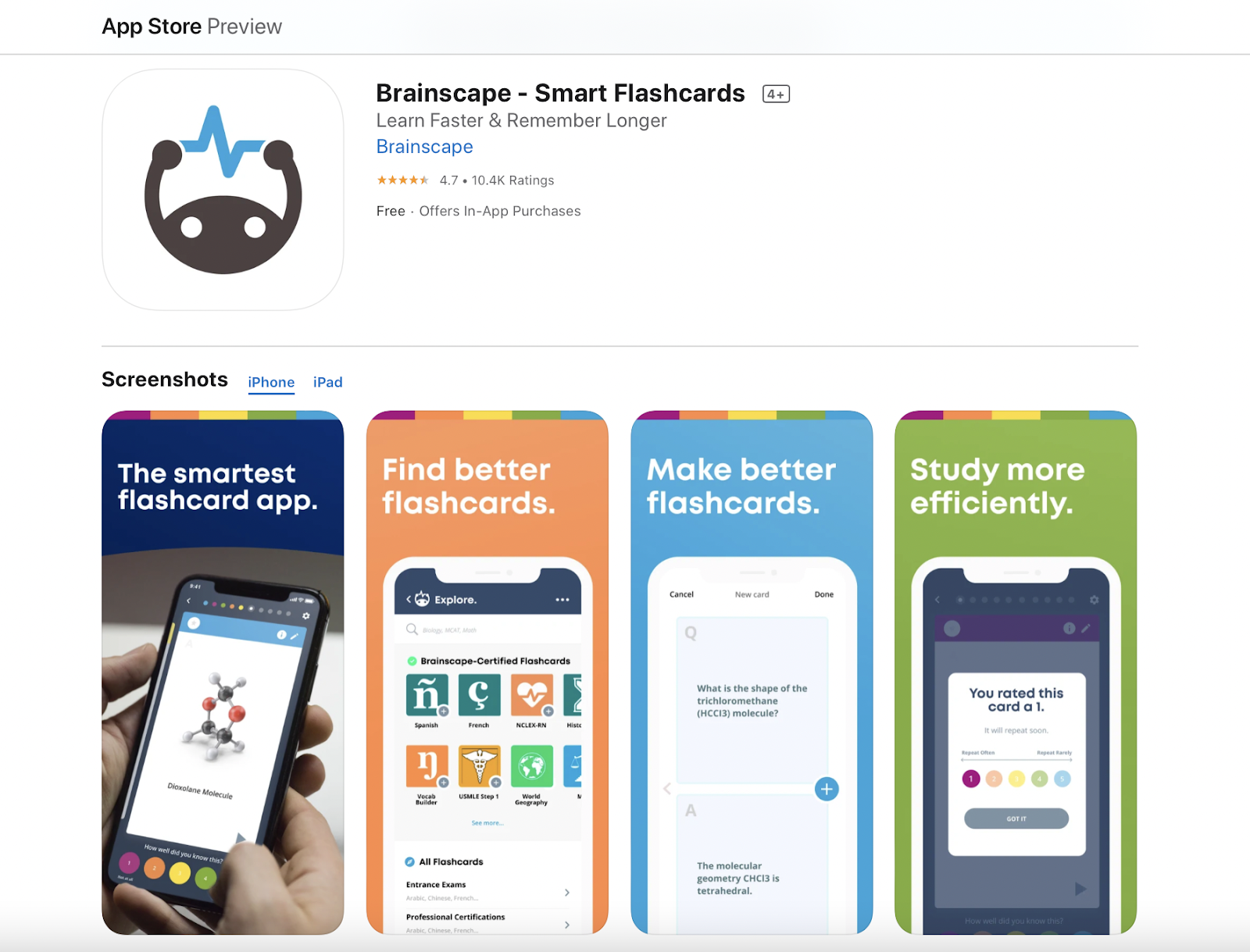
When considering Brainscape as an Anki alternative, students often focus on differences in user interface, study modes, and pricing. In addition to these aspects, Brainscape offers unique features that distinguish it from Anki, providing distinctive functionalities to enhance your learning experience.
Brainscape Review: Flexible Flashcard Format
Brainscape’s content creation formats are more flexible than Anki’s. Instead of just an image or a vocabulary word in a small text box, Brainscape flashcards have an open canvas for much richer types of questions and answers of various lengths and formats, making creating flashcards easy and flexible. Students can create flashcards in various formats to suit their study needs. These flexible formats facilitate content creation that promotes a deeper understanding of the material as a whole and not just isolated names, dates, and vocabulary.
Brainscape Review: Easy to Curate and Organize Knowledge
Brainscape's advanced features fundamentally make it easier for learners to organize their material by:
- “Curating” flashcard collections from various sources (both within Brainscape and from outside),
- Organizing flashcards into decks and decks into “classes”,
- Editing cards in real-time from any device,
- “Bookmarking” particularly important cards from across various topics or decks, and
- Creating study mixes across lots of different areas.
Brainscape streamlines the process of creating, curating, and organizing flashcards, making it simple and efficient for students to manage their study materials.
Improving the way that learners and educators organize their knowledge is a major part of Brainscape’s mission.
Brainscape Review: Easy to Collaborate with Other Learners
Brainscape is also a more collaborative platform. Multiple editors can easily work on the same flashcard decks like a shared Google Doc, holding each other accountable for flashcard creation. Brainscape allows users to share flashcards with others, making it ideal for study group activities where multiple learners can collaborate in real time. This inspires teams to work together on shared decks to make great flashcards for a shared class or learning experience.
In contrast, in Anki, only one author is permitted per deck, which puts the kibosh on collaborative learning. Anki decks are never shared decks.
Brainscape Review: Trusted Certified Content
Because of these collaboration features, Brainscape is able to work with subject-matter experts to create certified flashcard collections that are comprehensive for a particular exam, professional certification, course, or language. Brainscape can also organize these study materials into a structured course or cohesive learning path, making it easier for students to follow a complete program. These are formatted in a way that fosters the best possible learning experience, while constant feedback loops allow other learners to suggest edits for further improvement, i.e., you know you can TRUST this content.
With Anki, however, there is no certified content, only user-generated content, and this isn’t ranked according to quality and popularity, so you have no idea what you’re getting when you access another user’s flashcards.
Brainscape Review: Trusted User-Generated Content
Brainscape DOES rank its user-generated content in order of popularity (which indicates quality, accuracy, comprehensiveness, and usefulness). However, the quality and comprehensiveness of user-generated flashcards can vary depending on the creator. So, when you search for a subject on Brainscape’s Knowledge Genome, you can trust that the flashcards that appear first in the search results are the best in their category, second only to Brainscape’s certified content (if there is a class for that subject).
Brainscape Review: Opportunities for Partnerships
Another benefit of Brainscape’s collaborative tools is their ability to support reseller partnerships, school licenses, and enterprise licenses in a way that isn’t possible with Anki.
What this means is that if you’re an “influencer” in your field, you could become a reseller of Brainscape’s flashcards; or, if you have proven expertise, you could partner with Brainscape to create certified content; or you could make your own content private and sell it, which could generate a passive income for you. Anki simply doesn’t support any of these opportunities.
Brainscape Review: Artificial Intelligence
What if you want to go straight from your study notes to studying flashcards without all the hassle? Brainscape’s AI toolkit reads your content, intelligently divides it into individual flashcards, and presents you with a customized set of flashcards. These AI features enhance the process by making flashcard creation faster and more efficient, and can even incorporate audio into your flashcards for a more dynamic and engaging study experience. Just show it your notes and you’ll be ready to study within minutes.
While individuals have attempted to code janky third-party add-ons to convert study notes to Anki flashcards, they’re not a part of its platform.
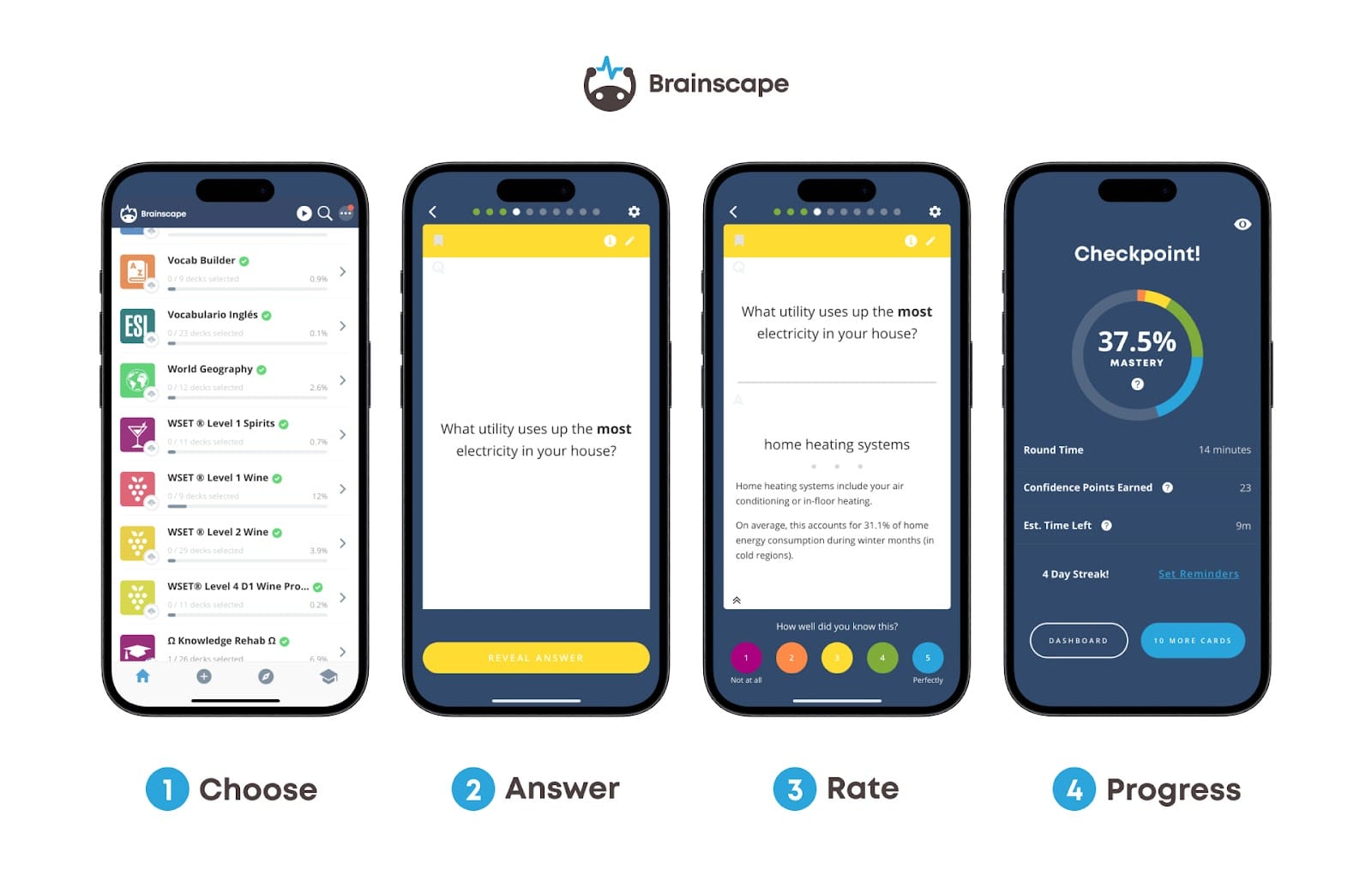
Brainscape Review: A Better User Experience
Brainscape offers an easy-to-use interface with a well-tested and implemented user experience. One of the biggest criticisms of Anki is that it is clunky and complex, hard to navigate, and delivers a poor user experience. And, fair enough, being free and open-sourced means that it doesn’t have the funding for more sophisticated design, features, and customer service.
What Does Anki Offer that Brainscape Doesn’t?
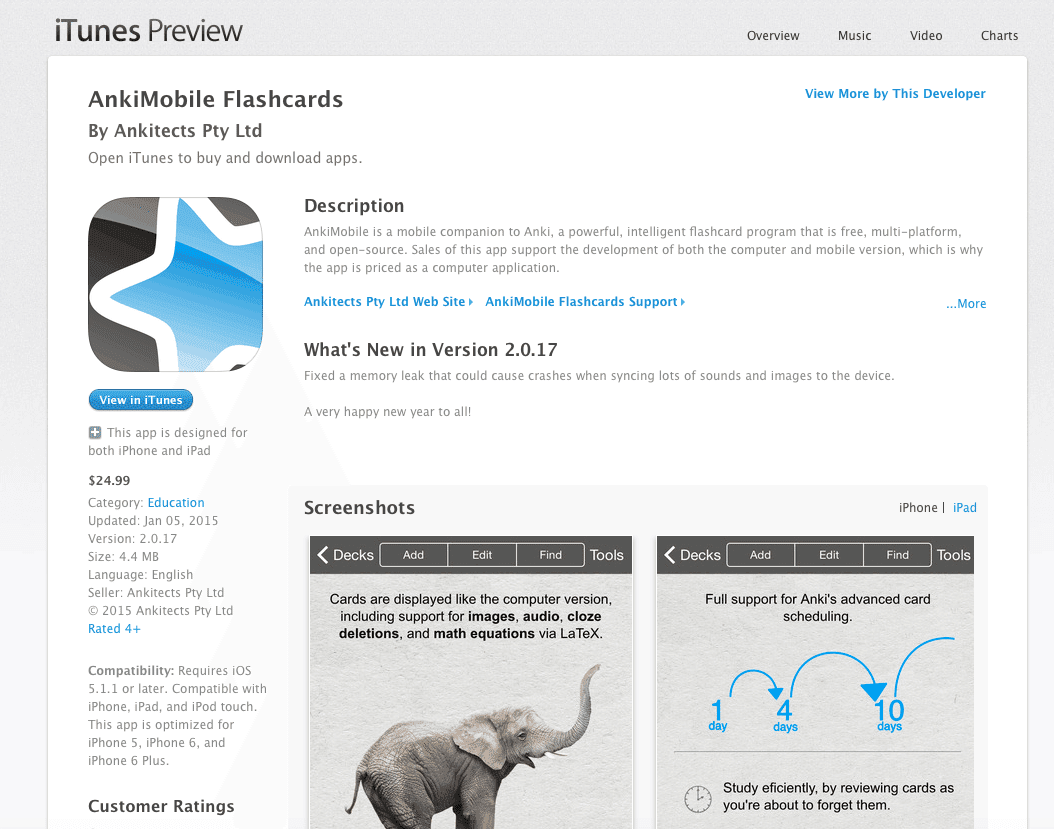
Anki is a powerful app known for its customizable features and robust algorithm. Many users appreciate its flexibility and the ability to tailor study decks to their specific needs. However, for those looking for an Anki alternative (perhaps seeking different features or a new user experience), other options like Brainscape may be worth considering.
Anki Review: Prescriptive Spaced Repetition Algorithm
To its credit, Anki is a very sophisticated tool that uses a more prescriptive spaced repetition algorithm. Its algorithm optimizes review intervals and adapts to the user's mastery level, thereby improving long-term retention by actually allocating a set number of days to each repetition, for example, “You must study this card again in 4 days.” Some extreme knowledge hackers prefer this degree of control.
With Brainscape, the spaced repetition isn’t quite so prescriptive. For example, if you rate a card a 4 and keep studying that day, it may eventually show up again once you’ve circled through all of the 1, 2, and 3-rated cards. Most of our users prefer this “relative” method of repetition scheduling rather than Anki’s “absolute” scheduling method, which won’t show you that card again for x number of days (and where you have to remember to come back in exactly X days or else that scheduled repetition is moot).
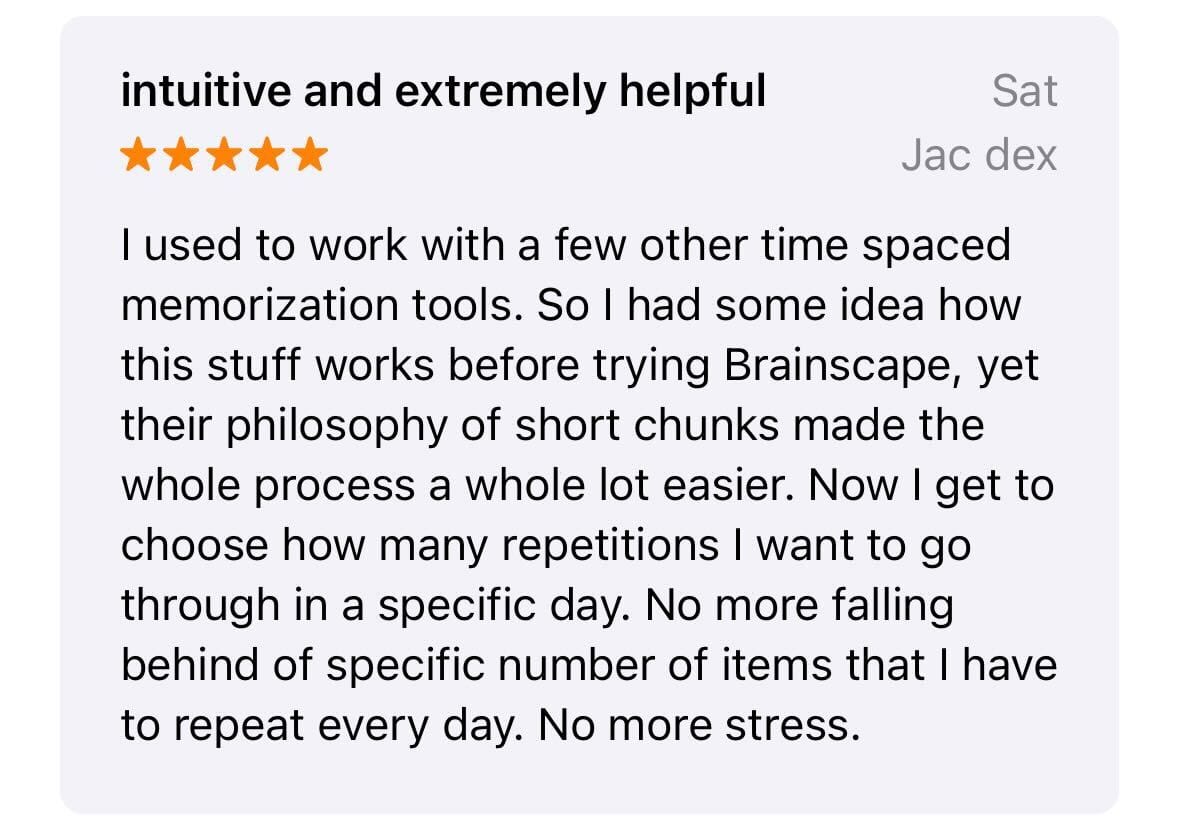
[Read more about Brainscape’s spaced repetition algorithm.]
Anki Review: Open-Source Software
Anki is an open-source software tool, which means that it’s free and open to all to use (except a $25 fee for the iOS app). The iOS app, known as AnkiMobile, is available for both iPhone and iPad, offering features like split-screen support on iPad, but it comes at a cost. The Android version, often referred to as AnkiDroid, is free and developed by a different team than the main app. While it provides solid Android support, it has fewer features and less polish compared to the iOS version. The desktop version is also free, but its interface is considered outdated and less user-friendly, with fewer recent feature updates, which can be discouraging for new users. Anki also offers a website for online access to flashcards and syncing progress across devices.
Some people philosophically prefer this to contributing to the growth of a profit-seeking company. While Brainscape’s basic features are also free, it does offer a Pro subscription model to help fund future innovation. This money is largely invested into paying subject matter experts to write new flashcards on their field, so you can at least rest assured that your subscription contributes to the field of education.
Anki’s cross-platform compatibility allows users to study on desktop, mobile, and web, syncing progress between devices. Additionally, offline access is supported, so you can review your flashcards without an internet connection. However, the lack of a dedicated developer for some versions, especially the desktop and Android apps, means updates and new features are less frequent, which can limit adaptability and user experience compared to more actively maintained alternatives.
Naturally, a free and open-source product won’t have the polish and flexibility that larger-scale operations like schools and businesses might require. However, if, as an individual, you like the charm of a free, open, and minimalist app, as well as even geekier study algorithm customizations than Brainscape, then Anki may be the perfect choice for you.
Summary: “Brainscape vs Anki” Points of Comparison
Both Anki and Brainscape are powerful study apps, but they offer different features and approaches to spaced repetition flashcards. Anki is known for its advanced customization, making it a favorite among power users who require in-depth control over their study material and study materials. However, some users find it time-consuming due to its manual setup and customization process. Brainscape, on the other hand, emphasizes efficiency and user-friendly design, appealing to those who want to quickly create and access study materials.
Both platforms support a variety of features such as progress tracking, quizzes, games, and mind maps, providing multiple ways to engage with study material. Integration of note and note-taking features is also important for comprehensive learning, helping users connect concepts and visualize information. Each app caters to different learning styles, with Anki offering more flexibility for those who want to tailor their experience, while Brainscape provides a streamlined approach for efficient studying.
FAQ: Brainscape vs Anki in 2025
Which is Better, Brainscape or Anki?
It depends on your needs. Brainscape is ideal for learners who value an intuitive interface, collaborative features, trusted expert content, and smart automation. Anki may appeal more to those who prefer full control over scheduling, customization, and a free, open-source environment.
What is the Best Free Flashcard App for 2025?
If you're looking for effective, ad-free studying with a clean interface and access to high-quality flashcard libraries, Brainscape’s free version is a top contender. Brainscape's spaced repetition flashcards remove the time-consuming work of creating flashcards and deciding what to study and when, offering a streamlined learning process and cross-platform compatibility. For those who want extreme customization and don't mind a steeper learning curve, Anki also remains a strong choice.
Why is Brainscape so Expensive?
Actually, you can make and study as many flashcards as you want FOR FREE, for always (without ads). But if you want to play with its advanced features like rich content formats, certified flashcard collections, AI flashcard creation tools, and robust data privacy, you'll need to upgrade to a Pro subscription. For many, the time saved and study efficiency gained justify the cost. Plus, its annual and institutional packages offer significant savings. However, the free version remains available for anyone who wants to create flashcards without paying a subscription, and always includes Brainscape's sophisticated spaced repetition algorithm.
Is Anki Overhyped?
Not necessarily. Anki is incredibly powerful for users who enjoy customizing their own system and want fine-grained control. However, for learners who prefer ease of use, better organization, and collaborative features without needing to tinker with plugins or settings, other platforms may be more practical. The advanced features of Brainscape, such as collaborative flashcard decks and expert content, make it a strong Anki alternative.
A Final Review of Brainscape vs Anki
Fundamentally, Brainscape and Anki are two different platforms that do the same thing very successfully: help serious students who are studying high-stakes subjects to learn much more efficiently.
Some people are die-hard fans of Anki, while others swear by Brainscape for life. So, it’s more about which one works best for you, the individual.
Naturally, we think we’ve done an excellent job of creating a scientifically optimized study system that is also a total pleasure to use (not to mention delivering a beautiful and seamless user experience). But, well … call us biased.
Hopefully, with the information laid out in this Anki and Brainscape review, you are empowered to know which is the best platform for you in 2025. We wish you the very best with your studies!
